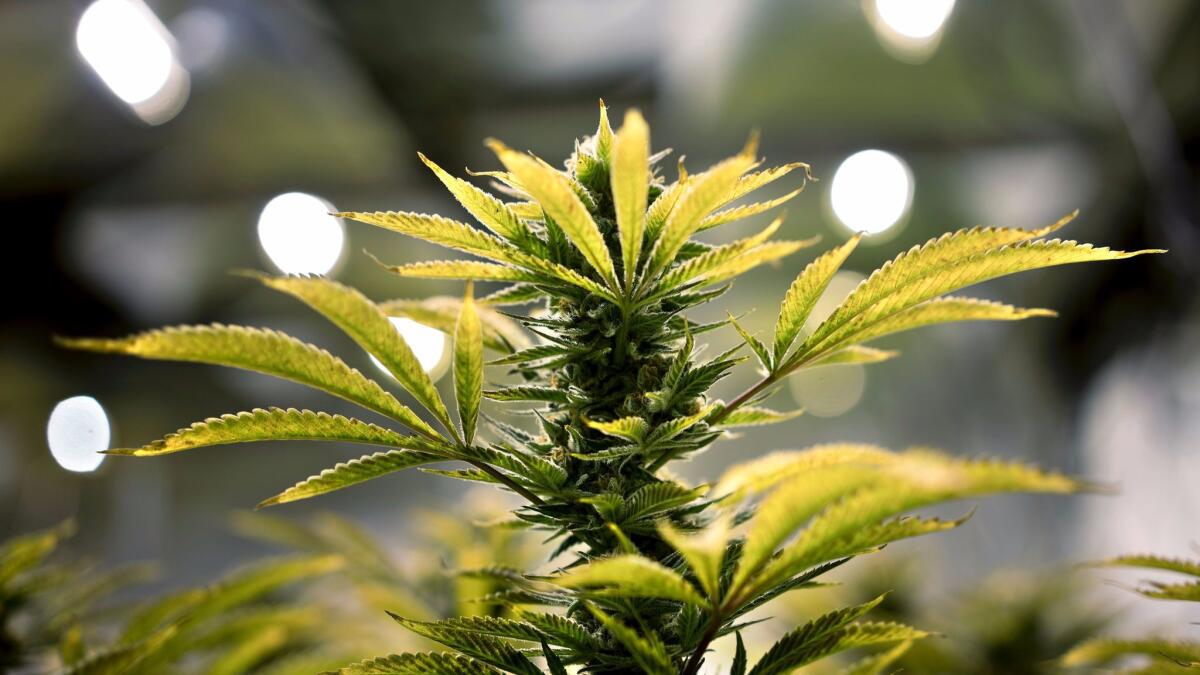Does driving while high create more crashes? Report hints that it’s possible

- Share via
In states looking to legalize pot, police and politicians often grapple with the same hard question: How will that affect road safety?
The topic has dominated discussions in legislative committee rooms from California to Massachusetts as well as on front porches across the country as activists gathering petition signatures have gone door-to-door trying to sway potential voters in legalization efforts. Now new data may bolster arguments against legalization.
A study released Thursday by a leading insurance research group showed an uptick in collision claims in states that have legalized marijuana.
In the years since recreational pot sales became legal in Colorado, Washington and Oregon, those states have seen a 2.7% increase in collision claims, according to the study from the Highway Loss Data Institute. The group used data from insurance claims, not from law enforcement records. Legal sales took effect in Colorado in January 2014, followed by Washington that July and Oregon in October 2015.
“It’s tricky to say what the exact magnitude of legal marijuana is on this increase,” said Matt Moore, senior vice president of the Virginia-based nonprofit. “But it’s safe to say that since retail sales have begun, crashes have increased in these states.”
The group used neighboring states — Idaho, Montana, Utah and Wyoming, to name a few — as controls and did before-and-after comparisons. After retail marijuana sales began in Colorado, the collision-claim frequency was 14% higher than in neighboring Utah and Wyoming, according to the report. Washington’s estimated claim frequency was 6% higher than in Montana and Idaho.
Trying to gauge how high is too high behind the wheel has long perplexed states. Unlike for alcohol, there is no on-scene Breathalyzer for marijuana that’s widely used, so confirming pot use requires that officers take drivers to police stations to administer a blood test. And there’s another question: What’s a reasonable cutoff?
Some states, such as Colorado and Washington, have established 5 nanograms of THC per milliliter of blood as a legal standard for judging whether someone is driving under the influence. THC is a chemical compound in cannabis responsible for its psychological effects.
The study released Thursday already has its critics.
Mason Tvert, a spokesman for the Marijuana Policy Project, a group dedicated to ending marijuana prohibitions, said the report showed “some correlation but not causation.”
“In other words, it found a slightly increased risk of collisions in states that have made marijuana legal for adults, but it did not actually look at the causes of collisions and does not show marijuana is to blame for that increase,” Tvert said, adding that his group takes seriously the issue of combating driving while high.
“It is important that governments and businesses continue to educate the public about the danger of impaired driving — whether it is by cannabis, alcohol or other substances — as well as the laws that prohibit it,” he said.
In recent years, some states that have legalized pot, such as Colorado, have launched extensive advertising campaigns warning of the dangers marijuana poses to kids and teenagers, and also of the risks of driving while high.
Moore said the study was an important step toward equipping states with all the facts as they consider legalizing pot. “It’s a concern worth monitoring and looking at over time,” he said.
Since 2012, voters in eight states have approved ballot measures legalizing the purchase and possession of marijuana for anyone 21 and older. This year several states seeking tax revenue from pot sales tried to legalize marijuana through legislative action; all the efforts have faltered.
In Rhode Island, Democratic state Sen. Josh Miller has led an unsuccessful effort to legalize pot for the last four years.
This year, his legalization bill remains stalled in a committee as the session winds down to a close this month. State Atty. Gen. Peter F. Kilmartin was among those opposed to legalization, citing, among other things, the need for more research on legalization efforts.
Asked about the study, Miller said he remained undeterred in his efforts.
“The details,” he said, “are always more important than the headlines with such studies.”
Twitter: @kurtisalee
ALSO
Here’s what Colorado’s governor has to tell other states about legalizing marijuana
Here’s what’s driving lawmakers working to legalize recreational pot in 17 more states
Following the example of voters, legislatures are trying to legalize marijuana — with mixed results
More to Read
Sign up for Essential California
The most important California stories and recommendations in your inbox every morning.
You may occasionally receive promotional content from the Los Angeles Times.











